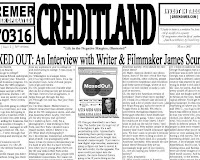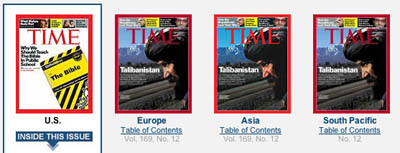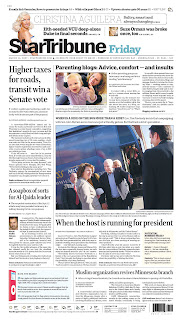 Growing up in Hopkins, Minnesota, David Carr observed his dad’s morning ritual, which involved toast and a copy of the Star Tribune. "This, I thought, is what it means to be a grown-up,” he wrote in a January column for The New York Times. "You eat your food standing up, and you read the newspaper. So I did the same thing when I turned 13.”
Growing up in Hopkins, Minnesota, David Carr observed his dad’s morning ritual, which involved toast and a copy of the Star Tribune. "This, I thought, is what it means to be a grown-up,” he wrote in a January column for The New York Times. "You eat your food standing up, and you read the newspaper. So I did the same thing when I turned 13.”Today, having moved from editor of the now-defunct Twin Cities Reader in the mid-1990s to editor of Washington, D.C.’s City Paper, to his current job as a blogger and media writer for the Times, he still reads his morning paper that way. But his family, as he notes in that essay, doesn't: his kids are checking text-messages, Facebook, or the mail for Netflix arrivals, while his wife heads to work with iPod earbuds in place.
In Minneapolis this week, Carr witnessed the local impact of this technological shift away from the "paper artifacts" he grew up reading. He covered the protest on Thursday by Star Tribune employees facing buyouts and reassignments. And he characterized the legal feud sparked by Par Ridder's jump from publisher of the Pioneer Press to the top job at the Star Tribune as a distraction for companies that should be battling to stay alive: the fight, he wrote, is as if "two men, hanging off the cliff by the fingernails of one hand, decided to have a knife fight with the other hand."
Before he gave the keynote at the Society of Professional Journalists Page One Awards banquet Tuesday night, Carr spent a few minutes with Minnesota Monitor discussing how such shifts are affecting the Twin Cities. He weighed in on local media players, including former City Pages editor Steve Perry (praiseworthy as an editor, less so as an individual) and Nancy Barnes, the Star Tribune editor who seems "plenty sincere," but finds herself "playing out of George Orwell’s playbook" in spinning newsroom cuts as a "renewed focus." And, in considering the Times' successes, offered a bit of advice for managers who are pondering deeper cuts at area papers.
"I don’t think that staffing appropriately to come up with compelling content is a luxury," he said. "I think it’s a necessity. I don’t think you can cut your way to excellence or cut your way to viability."
As past editor of the Twin Cities resident and editor who's now a New York Times media columnist, you have an interesting insider/outsider vantage point. With what’s gone on here with Village Voice Media and City Pages, the Pioneer Press lawsuit and the layoffs that preceded it, and the Star Tribune’s restructuring, what does it look like from where you sit?
I picked up a copy of City Pages this week as I always do, and compared to other alternatives, it’s a really good paper. I still have hurt feelings about City Pages eventually running the Twin Cities Reader out of business. I wasn’t here but I still felt it. ...I’ve never much liked [former editor Steve Perry] or his approach. But I think as an editor, he really had few peers, in his ability to attract and sustain really, really great writers.
People like to talk about his superciliousness or his politics. The test is on the page. For years I’ve been coming back and seeing that paper, and I see papers all over the country. It’s a great paper. Or has been. And the idea that Village Voice Media didn’t have worse problems on their hands, I think is a joke. When you’ve got people like Britt Robson, Dave Schimke, Terri Sutton. Come on! Those are super-talented people.
Some say the New Times purchase of the Village Voice chain will lead to a more libertarian and less liberal — or perhaps more apolitical — kind of writing.
I share politics, probably, with Steve Perry, but I share newspaper approaches with [Village Voice Media]. I’ve always been, at both the Twin Cities Reader and at City Pages, equal opportunity in terms of choosing opponents and choosing targets. I’ve felt my job is to hold up a rigorous and true mirror that allows readers to make their own judgments. So I don’t know if that makes me a libertarian. I think it makes me a newspaperman.
I never wanted to work on an op-ed page. The other thing: [Village Voice Media] papers in general are far superior to most weeklies, and they fund great journalism, pay a living wage, pay healthcare. So many times the weeklies talk about how bad the dailies are, and I always think to myself: “Have you looked at your own paper lately? This thing sucks!”
What about the metro dailies? The lawsuit, the downsizing plans at the Star Tribune? What does that look like from your office at the New York Times?
I’m a person who grew up reading both those papers. My heroes worked at both those papers.
Who were some of those heroes?
I watched Eric Black, Tom Hamburger, Stormy Greener, Dane Smith at both papers, and I mean not just to restrict it to them. Local journalism in general was great: Eric Eskola [of WCCO and TPT], Pat Kessler [at WCCO], you name it. These people were giants to me. So, to watch papers — first the Pioneer Press -- cut right to the bone and foregoing their ambitions is sad.
I loved how the Pioneer Press was positioned as a feisty, nimble, fairly muscular competitor. The Star Tribune I don’t think has been trending well as a media organization. I think it’s a fairly safe paper. It’s far too focused on what they think the reader wants, as opposed to covering what they do. But they’re still within the bandwidth – plenty of great journalism: Paul McEnroe, Jon Tevlin, you name it.
To watch newspaper reporters out marching like steelworkers and raising their fists at the building they work in was scary and frightening to me. I don’t think there’s a boat high enough to really – you shouldn’t position me as being in a perch at the New York Times. You know, the people at the Wall Street Journal thought they had a pretty good perch two weeks ago. All the sticks are up in the air, and I don’t think anybody should feel too smug about what they’re doing. The regionals got problems. The nationals got problems. Small local dailies with monopolies still seem to be OK.
The question is how do they get from one ledge to the other? If there is a digital future how do they get there and still have the branded, quality, local content that gives them the edge?
What about local? A lot of what Nancy Barnes, the editor of the Strib, has said, and much of what we’ve heard since the 2005 redesign, is about “local, local” -- that we can make a difference by being intensely local. But I’ve also heard a lot of criticism about what might be left out -- world and national news that people need to be engaged civic participants – of that equation.
The Star Tribune gave up on a lot of that slowly over time. They had two people in their national bureau, really good ones, and now they’re going to one. The fact that there’s going to be no Duluth bureau, that somehow not having Larry Oakes in Duluth is good? I mean, c’mon! Duluth is a huge news bed. It’s a port city; it’s a place where you can jump off and cover the other half of the state. That can’t be good for the state. It can’t be good for the readers. It can’t be good for democracy.
She is saying these things partly because she has to, partly because she has to believe it. I talked to her the other day. She seems plenty sincere, but any editor who’s selling cutbacks as a renewed focus is going to be playing out of George Orwell’s playbook: more is less, less is more. You know what I mean? You have to engage in doublespeak, because you can’t step up to the mike and say, “You know what? This really sucks.”
It seems there’s a lot of injustice to many of the workers who’ve been at the paper a long time, have developed an expertise, and now are being assigned out of their jobs. But, on the other hand, there are some harsh financial realities—
You bring up a great point. We’ve always written without much emotion about job cuts or job reassignments in other industries, and now that it comes around to our industry, we’re squealing like a pig. I do think there’s an increased sensitivity and awareness because it’s our ox that’s being gored. And I do not doubt there are people that doubt the direness of the financial situation. But when you’re talking about classifieds down 30 percent year over year, that is a significant business problem. But you cannot work only the cost side to fix that.
Gary Gilson, head of the Minnesota News Council, recently praised a piece you wrote about changes at The New Republic. “It seems to me that people interested in journalistic standards could have a rich discussion about objectivity if they focused on a story such as Carr’s,” he wrote. “What I loved about Carr’s storytelling was the fact that he convinced me that he KNEW what he was talking about and he TOLD us, instead of hiding behind the journalistic convention of having to attribute every idea to some authoritative source.”
He seems to be saying you wrote with attitude and edge, rather than that here’s-one-side/here’s-the-other kind of scientific method—
What’s funny about that: that was my first straight news story coming off the blog, and I’d been blogging for four months. That was a blog hangover where I was just stepping up and writing what I thought. When I used to work here, I think it was Richard Broderick who said, “Truth is not the hole in the middle of the donut.” It’s on the donut somewhere.
I think part of the Strib's problem is that they’re so concerned with being even-handed and the perception that, because their editorial page is liberal, that they’re somehow a liberal paper. I think they’re far too careful in their discourse. You have to make a good reasoned argument, you have to be completely fair, you have to be able to back up everything you say with efficacious reporting, but achieving some sort of formal balance I think is a little bit of an archaic news concept and it reads as such. It reads, sort of... boring.
As a somewhat younger reader, I liked the tone you established. Papers like the Strib say that to stay afloat, they need to figure out how to engage these younger audiences, and maybe that writing style is one way to do it.
There's been a slow, creeping but very definite innovation in tone and content at the New York Times for some time. People say, how can you get away with writing what you want? It’s not an issue. What’s an issue is if you get it wrong, than flying monkeys come out of the ceiling and kill you.
To be modern, to be engaging, to do as you pointed out, to reach out to audiences in demographic terms -- not philosophical terms -- you have to do a direct address to the readers, and that’s not about what you think. It’s about what you’ve found out. I don’t write about the space between my ears. I’m a reporter all the way. Even though I do a media column, it’s extremely reported.
I interviewed Steve Perry awhile back and he said watching mainstream media like the Star Tribune trying to adapt to new technology and relate to readers is like "seeing your grandma in stretch pants, doing The Robot." I feel like, finally, they’re catching on, with Buzz.mn and blogs like Eric Black’s where readers can have conversations, but it seems they have so far to go to adapt to this online environment.
People like you need to think what you do is magical and effable and tough to do, and it’s not. We’ve got 27 blogs at the New York Times, and we have a lot of business on our blogs. You’d like to think it’s big and mysterious and so hard to do. It’s not really. It’s having the permission from ownership to experiment. A lot of times at the New York Times what we’re doing is saying, “Let’s give it a whirl.” ...Because we have such a tight feedback loop with our audience and we’re not up on Olympus, we find out fairly quickly what works and what does not.
Do you think you could do that if you had to cut your newsroom by 20 percent like the Strib is doing?
We’ve had significant buyouts. But there’s no question I live an entitled existence in terms of the level of staffing. But you’ve got to keep in mind that with all those people comes a great ambition to not just cover a city, not just cover a state, not just cover a country, but cover a world. There’s not many Scrabble players at The New York Times. There’s not many people who stroke their beards. Everybody is engaged. I don’t think that staffing appropriately to come up with compelling content is a luxury. I think it’s a necessity. I don’t think you can cut your way to excellence or cut your way to viability.
We’re insulated by our two-tiered staff structure, but so is Dow Jones, and it seems like there’s some kind of questions about that. I do think that so far private equity as an owner of a newspaper, with their need for high margins and quick exits, have been a flop so far. Who knows?
Do you long for the Cowles days, the private ownership days?
Yeah, I do. I prefer to work with people I have values in common with. [Times publisher] Arthur Sulzberger and I don’t have a lot in common in terms of background, but we share values up and down. I don’t spend a lot of time talking to the guy, but when I see him, I think we both are oddly bullish about the newspaper business.
We’re growing audience. We’re diversifying into online businesses in meaningful ways. But when you belong to public markets or you belong to private equity, the clock ticks at a rate where it’s very difficult to innovate your way to the future. No one wants to hear about five quarters. They want to know what’s going to happen this quarter.
You can’t blame them. I mean, money has no conscience.
[Cross-posted at Minnesota Monitor.]














